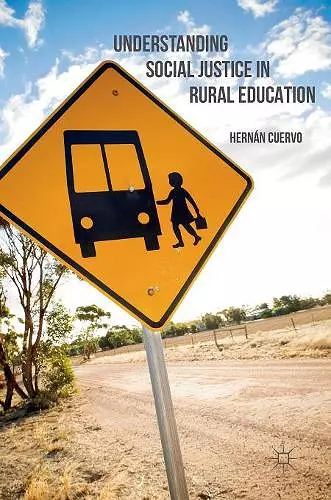Understanding Social Justice in Rural Education
Format:Hardback
Publisher:Palgrave Macmillan
Published:22nd Sep '16
Currently unavailable, and unfortunately no date known when it will be back

"With a level of breadth and depth that is rare in educational research, Cuervo insightfully weaves together three bodies of literature-namely, rural schooling, neoliberalism and education, and social justice-to foreground this important new study about the state's neglect of rural schooling in Australia. Scholars and educators will find this book to be of relevance, significance, and timeliness as it gives specificity to the more global problems of neoliberalism as the operative ideology in education policy and practice, too commonly existing alongside impoverished frameworks for thinking about reform with an eye toward justice." (Kevin Kumashiro, Dean of the School of Education at the University of San Francisco, USA, and author of "Against Common Sense: Teaching and Learning toward Social Justice", 3rd Edition) "Cuervo raises important questions about how the educational machinery is understood for rural schools. He meticulously argues that place does and should inflect the way justice is understood and imagined beyond popular liberal ideas of distribution. A remarkable breadth of theoretical space is opened up, without ever losing sight of two small places in Australia that sit at the heart of the analysis. This is a timely and scholarly book, engaged with crucial questions that concern ordinary citizens and educators." (Michael Corbett, Professor of Rural Education at University of Tasmania, Australia, and author of "Learning to Leave: The Irony of Schooling in a Coastal Community")
This book explores what social justice looks like for rural schools in Australia.
This book explores what social justice looks like for rural schools in Australia. The author challenges the consensus that sees the distribution of resources as the panacea for the myriad challenges faced by rural schools and argues that the solution to inequality and injustice in rural settings has to take into account other important dimensions of social justice such as recognition and association. These include teachers’ concerns for issues of power, respect, and participation in their work that extend to policy-making processes and implementation; students’ post-school aspirations and, finally, parents’ hopes and fears for their children’s futures and the sustainability of their community. The book brings together political and social theory with education and youth studies, provides new insights about the complex nature of schooling in rural places, and makes a strong connection between schooling and the people and communities it serves.
ISBN: 9781137505149
Dimensions: unknown
Weight: 3947g
215 pages
1st ed. 2016